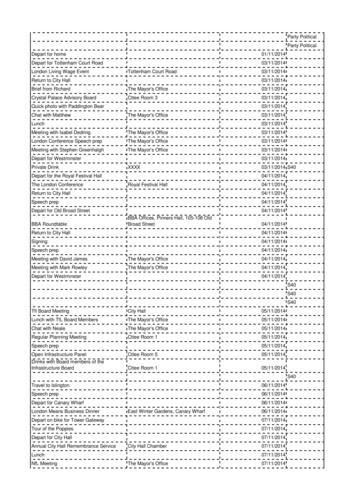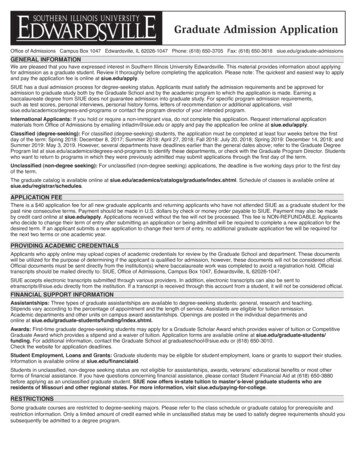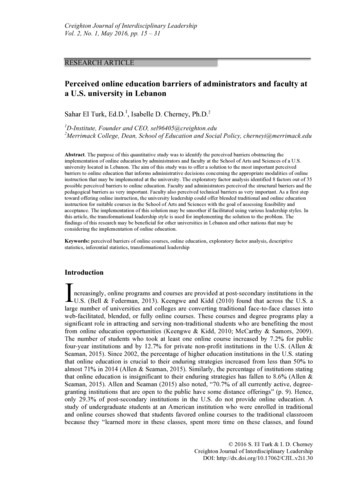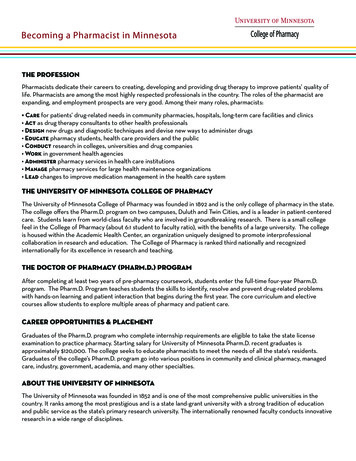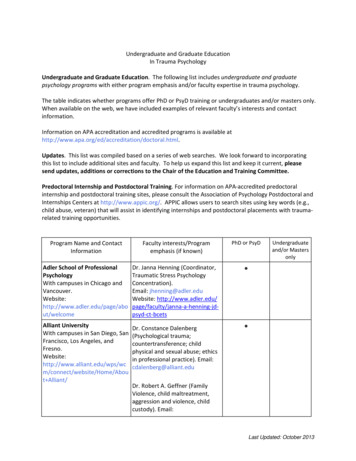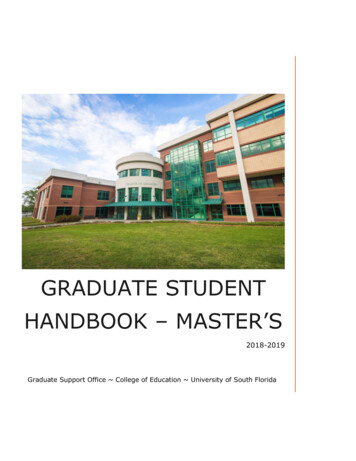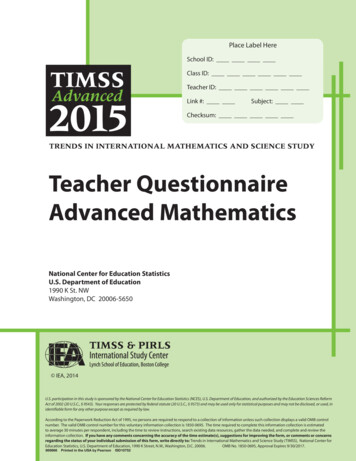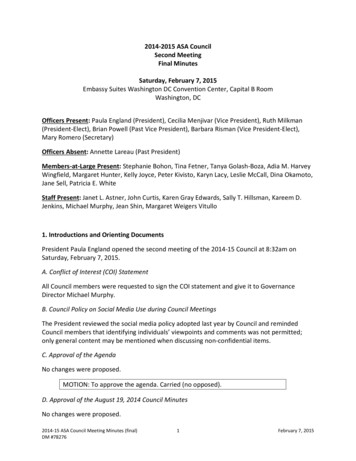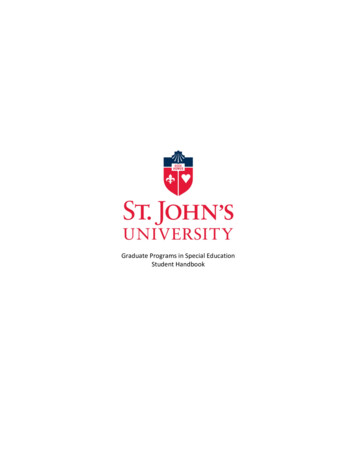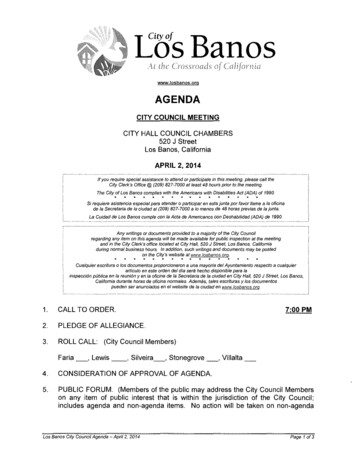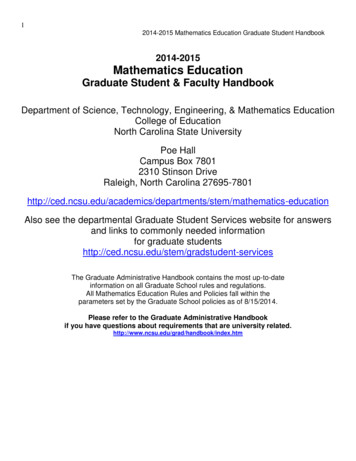
Transcription
12014-2015 Mathematics Education Graduate Student Handbook2014-2015Mathematics EducationGraduate Student & Faculty HandbookDepartment of Science, Technology, Engineering, & Mathematics EducationCollege of EducationNorth Carolina State UniversityPoe HallCampus Box 78012310 Stinson DriveRaleigh, North Carolina s/stem/mathematics-educationAlso see the departmental Graduate Student Services website for answersand links to commonly needed informationfor graduate cesThe Graduate Administrative Handbook contains the most up-to-dateinformation on all Graduate School rules and regulations.All Mathematics Education Rules and Policies fall within theparameters set by the Graduate School policies as of 8/15/2014.Please refer to the Graduate Administrative Handbookif you have questions about requirements that are university m
22014-2015 Mathematics Education Graduate Student HandbookGeneral Information .4Introduction .4ADMISSIONS PROCEDURES .5IMPORTANT PLACES & PEOPLE .6MATHEMATICS EDUCATION G RADUATE FACULTY PROFILES .8FINANCIAL AID 10Internal .10External .12Support for Dissertation Research .13FULL -TIME STATUS 14GRADUATE STUDENT SUPPORT PLAN (GSSP) 14NORTH CAROLINA RESIDENCY .14INTERNATIONAL STUDENT I NFORMATION .15LIVING .15GRADUATE STUDENT COMMUNITIES .15NC COUNCIL OF TEACHERS OF MATHEMATICS—KAPPA CHAPTER .16ELECTRONIC THESIS AND DISSERTATION (ETD) .16ACADEMIC I NTEGRITY AND RESEARCH ETHICS .17TAKING COURSES FOR CREDIT AT LOCAL INSTITUTIONS .17MATHEMATICS EDUCATION G RADUATE COURSE ROTATION SCHEDULE 18TEACHER LICENSURE 18FORMS 19Masters Degree Program in Mathematics EducationINTRODUCTION 20EXPECTATIONS .20TIMELINE .20MASTERS PROGRAM REQUIREMENTS 22Coursework 22Minor .26Plan of Work and Graduate Advisory Committee . 26PROFESSIONAL DEVELOPMENT .27PLANNING FOR THE FUTURE .28
32014-2015 Mathematics Education Graduate Student HandbookADMINISTRATIVE —SCHEDULE OF REQUIRED DOCUMENTS .28Doctoral Degree Program in Mathematics Education 29INTRODUCTION .29EXPECTATIONS & RESIDENCY .29TIMELINE .30Coursework .33Plan of Work and Graduate Advisory Committee 37Minors .38Grades in Courses and Overall GPA 38Preliminary Examination 41Dissertation . 42ADVISING/MENTORING .44Scholarship 45RESEARCH EXPERIENCE .45TEACHING .46PROFESSIONAL DEVELOPMENT .46JOB SEARCH .48ADMINISTRATIVE .49APPENDICESMasters inquiry project evidence for M licensure 50Application for graduate professional internship .52SAMPLE LETTER TO TEACHER AND ADMINISTRATOR 55MATHEMATICS EDUCATION PRELIMINARY WRITTEN EXAMS EVALUATION REPORT .56EVALUATION RUBRIC: DISSERTATION PROPOSAL PRESENTATION 57EVALUATION RUBRIC: DISSERTATION FINAL ORAL EXAM 58
42014-2015 Mathematics Education Graduate Student HandbookGeneral InformationIntroductionThe NC State Mathematics Education graduate programs are competitive and recognized for their quality atthe state and national level. In 2007, Reys, Glasgow, Teuscher, and Nevels reported that NC State’s doctoralprogram was ranked (19th) as one of the top programs in the nation for having a “particularly strong doctoralprogram and one you would recommend.” Reys et al. (2007) also reported that the Mathematics EducationPh.D. program at NC State is a top producer of mathematics education doctorates in the United States -ranked 8th in production since 1990, and 4th since 2000. Also in 2007, the Chronicle of Higher Educationreported NCSU’s Mathematics Education faculty as ranked 5th in the nation on the Chronicle’s computedFaculty Scholarly Productivity Index .The Mathematics Education graduate programs are administered in the Department of Science, Technology,and Mathematics Education in the College of Education. A strong emphasis on pedagogical contentknowledge, disciplinary content knowledge and technological innovation in improving schooling is a definingcharacteristic of our graduate programs. Masters students take their minor courses in the Departments ofMathematics, Statistics, Computer Science, and occasionally Operations Research. Two degrees are offeredat the master’s’ level, a Master of Education (M.Ed.) and a Master of Science (M.S.) and one at the doctorallevel, a Doctor of Philosophy (Ph.D.).*The mission of the various options offered in Mathematics Education at the Master's level is to prepareMaster’s Degree-seeking students for positions of instructional leadership in Mathematics Education as masterteachers of mathematics in either middle grades (6-9), high school (9-12) or post-secondary institutions suchas community colleges.The Ph.D. Degree program in Mathematics Education enrolls students who are knowledge-seekers and areeager to pursue educational problems and develop critical thinking skills in a collaborative environment. Theprogram prepares individuals to be knowledgeable about and prepared to accept positions related to:1) scholarly inquiry and discourse in mathematics education,2) preparation of K-12 mathematics teachers,3) instruction and development issues in K-16 mathematics, and4) leadership positions in mathematics education.Close affiliation and research opportunities at the William and Ida Friday Institute for Educational Innovationprovides our students with exceptional opportunities to explore the role of technological innovation inmathematics education and pursue related research.Programs at each level build upon the preparation found in the mathematics education programs of theprevious level. The master’s degree program is built upon and assumes a strong preparation in mathematicsand mathematics education at the undergraduate level. The design of the Ph.D. program, in turn, assumes thepreparation defined in the master’s degree program.[* Note: Students enrolled in the Master of Arts (M.A.T.) program pursuing 9-12 licensure take many classes within our department;however their program is administered through the M.A.T. office. See http://ced.ncsu.edu/mat/mathematics.]
52014-2015 Mathematics Education Graduate Student HandbookADMISSIONS PROCEDURESApplicants to both the Master’s and Ph.D. degree programs are strongly preferred to have K-16 teachingexperiences. The faculty views such experience as a strong foundation on which to build rigorous advanceddegree preparation. Although the Graduate School has made rare exceptions, applicants are expected to haveat least a 3.0 undergraduate GPA (out of 4.0) in mathematics education or a related program of study. GREscores are used as a complement to undergraduate performance; verbal scores at or above the 50th percentileand quantitative scores at the 75th percentile are preferred. Verbal and Analytical Writing scores on the GREare especially important for Ph.D. applicants as they are deemed as an initial indicator of students’ writingability. Students’ writing ability and their suitability for studying mathematics education are also assessed viathe writing sample (personal statement) provided by students in the application process. Faculty membersdiscuss each candidate’s application folder and vote to admit or not admit. Graduate students who areadmitted to our programs typically have an undergraduate GPA above 3.30 and GRE scores above: 151 V(50th percentile), 157 Q (75th percentile), and 4.5 AW. Overall, in 2013, the students that were admitted to ourgraduate programs had a mean score in GRE Verbal of 152.5 (53rd percentile), and mean score in GREQuantitative of 159.1 (82nd percentile).Applications are reviewed twice per year, with all documents submitted for review with deadlines of October 1and February 15. Applicant’s academic record, GRE scores, recommendations, and personal statement areconsidered jointly in making admission decisions. Personal statements should include information aboutexperiences in mathematics education but should also include career goals and why the applicant feels thatthe NCSU graduate program is a good fit for their experiences and career path.As applicants to the program are reviewed, faculty considers the applicant’s background and interests inrelation to faculty expertise. Upon recommendation of the graduate faculty to accept an applicant into theprogram, a faculty member agrees to be the initial advisor/chair.Admissions decisions and any offer of financial aid are done as two separate processes. Admission does notguarantee an offer for financial aid.***If a currently enrolled Master’s student wishes to continue on to pursue a Ph.D., they do NOT needto submit a new application. An interested Master’s student should submit a personal statement to thegraduate program coordinator and graduate administrative assistant before the deadline of October 1and February 15. The statement should address why the student wishes to pursue the PhD degree anddiscuss their progress on their research for their masters degree. ***
62014-2015 Mathematics Education Graduate Student HandbookIMPORTANT PLACES & PEOPLEDepartment of Science, Technology, Engineering, & Mathematics EducationPoe Hall Suites 326, 502, and 510Main Telephone: (919) 515-2238919 is area code for all campus numbershttp://ced.ncsu.edu/stemDepartment Head Dr. Kathy Trundlekctrundl@ncsu.eduAaron ClarkDirector of Graduate Programs [DGP] in departmentPoe 510Phone: 515-1771Fax: 515-6892Aaron clark@ncsu.eduThe DGP is the department’s liaison to the College of Education and the University Graduate Schooland helps coordinate flow of information among faculty, students and administration. The DGPcorresponds with all potential applicants and oversees the application and admittance process. Dr.Clark has to approve and sign all official paperwork related to a student’s education (e.g., Plan of Work,Request for Preliminary or Final Examination, Termination of a Students’ Program).Karen Allen KeeneGraduate Program Coordinator for Mathematics EducationPoe 502Phone: 513-3374Fax: 515-6892kakeene@ncsu.eduDr. Keene is responsible for the organizational leadership of graduate programs in mathematicseducation. She works with faculty and students in mathematics education to ensure all understand thepolicies and program guidelines so that every student has a positive educational experience. Dr. Keeneoversees the review of applications and works with the DGP and Graduate Secretary to process allapplications. She is the program liaison to the College of Education (e.g. teacher education,accreditation, and licensure)Christy BuckGraduate Administrative AssistantPoe 510Phone: 515-1740Fax: 515-6892cjbuck@ncsu.eduMs. Buck handles all aspects of graduate education, including: admission applications, initial forms fornew students, scheduling students in courses based on permission of instructor, all paperwork forgraduate education (e.g., Request for Preliminary or Final Examinations), completion of forms forgraduation.Tiwa AshiruBusiness Services Coordinator, DepartmentPoe 326Phone: 515-6903toashiru@ncsu.eduMs. Ashiru oversees the financial administration of the department. Related to graduate education, sheinitiates all assistantship offers from departmental funds. She also handles all other financial requests(e.g., reimbursement for travel, forms for part-time work students).
72014-2015 Mathematics Education Graduate Student HandbookArnita AdamsFinancial and Human Resources Manager, Friday Institute for Educational InnovationFriday Institute, Centennial CampusPhone: 513-8537atadams@ncsu.eduMs. Adams handles all financial matters for grants and projects associated with the Friday Institute.Thus, graduate students who are employed through a grant or project at the Friday Institute will see Ms.Adams for the processing of all assistantship offers and paperwork related to employment.Tim GoodaleProgram Coordinator for Mathematics Education in Masters of Arts in Teaching (MAT) program1525 Partners II Building, Centennial Campus Box 7271Phone: 515-1065tagoodal@ncsu.eduDr. Goodale coordinates all the M.A.T. programs in the STEM Ed department. Thus, he serves as theadvisor for M.A.T. students pursuing high school licensure in mathematics. If you are interested inteaching licensure, please discuss this program with Dr. Goodale.Michael MaherDirector of Professional EducationPoe 204Phone: 515-5524Fax: 515-5901Michael maher@ncsu.eduDr. Maher, and his administrative assistant (Bonita Apperson bonita apperson@ncsu.edu) can assiststudents and faculty in arranging school-based field experiences related to licensure and thecompletion of all requirements and paperwork to apply for NC licensure, including, initial, advanced,specialist, and doctoral level licenses)Caroline Ortiz-DeatonManager, Student Financial Support Services for Graduate School2310H COTPhone: 515-4229acortiz@ncsu.eduChris Buchanan administers the Graduate Student Support Plan. He can answer specific questionsrelated to this plan. Also refer to the GSSP handbook at: .pdfCashier’s Office & Student Accounts: Hours 8am-5pm M-FStudent Accounts: (919) 515-2986Fax: (919) 515-1164http://www.fis.ncsu.edu/cashier/D. H. Hill Library: North campusPhone: (919) 515-3364See http://www.lib.ncsu.edu/ for hours and servicesCollege of Education Media and Educational Technology Resource Center: Poe 400Phone: (919) 515-3191See http://ced.ncsu.edu/metrc for hours and servicesOffice of International Services (OIS) - 320 Daniels HallPhone: (919) 515-2961Fax: (919) ncsu.edu
82014-2015 Mathematics Education Graduate Student HandbookMATHEMATICS EDUCATION GRADUATE FACULTY PROFILESJere Confrey, Ph.D. (Cornell University)jere confrey@ncsu.eduDr. Confrey is the Joseph D. Moore Distinguished University Professor. She teaches in the graduate programin mathematics education, and offers courses on learning sciences, curriculum development and evaluation,and related topics in mathematics education. Her current research interests focus on analyzing national policy,synthesizing research on rational number, designing diagnostic assessments in mathematics focused onstudent thinking, building innovative software linking animation and mathematics, and studying schoolimprovement for under-served youth at the high school level in rural and urban settings. She holds multiplegrants from the National Science Foundation and currently serves on the Research Council for NCTM.Karen Hollebrands, Ph.D. (The Pennsylvania State University)karen hollebrands@ncsu.eduPoe 502513-0505Dr. Hollebrands is a Professor in Mathematics Education. Her research interests include understandingstudents' mathematical understandings in technological contexts, as well as preparing prospective andpracticing teachers to incorporate technology into mathematics instruction.Karen A. Keene, Ph.D. (Purdue University)karen keene@ncsu.eduPoe 502513-3374Dr. Keene is an Associate Professor in Mathematics Education. Her work is focused in two primary areas. Sheconducts research on the teaching and learning of differential equations at the undergraduate level. She isparticularly interested in how students learn in inquiry oriented tertiary classrooms. She also is interested inhigh school mathematics teaching, including knowledge of mathematics needed for teaching at the high schoollevel and developing a new fourth year high school math course based in operations research.Hollylynne S. Lee, Ph.D. (University of Virginia)hollylynne@ncsu.eduPoe 502513-3544Dr. Lee is a Professor in Mathematics Education. Her current research interests include teaching and learningof probability and statistics, especially incorporating technology use; designing technology tools that facilitatestudents' learning of mathematics (e.g., Probability Explorer, applets); and preparing preservice and inserviceteachers to use technology in 6-12 mathematics (e.g., PTMT: Preparing to Teach Mathematics withTechnology project). She also is a faculty leader on the Noyce Mathematics Education Teaching Scholarsprogram, which prepares highly qualified secondary mathematics teachers to work in high-needs schools.Allison McCulloch, Ph.D. (Rutgers University)allison mcculloch@ncsu.eduPoe 502513-2803Dr. McCulloch is an Associate Professor in Mathematics Education. Her current research interests includeunderstanding the role of the affective domain with respect to teaching and learning in technological contexts;mathematical play; and preparing prospective and practicing teachers to teach in culturally diverse classrooms.Dr. McCulloch also writes curriculum and conducts research around the preparation of teachers to usetechnology.
92014-2015 Mathematics Education Graduate Student HandbookKaren Norwood, Ed.D. (Temple University)karen norwood@ncsu.eduPoe 502513-8051Dr. Norwood is an Associate Professor in the mathematics education program. Her current researchendeavors focus on multiple representations and their effect on students' conceptual understanding of thefunction concept.Jimmy Scherrer, Ph. D. (University of Pittsburgh)jscherr@ncsu.eduPoe 317513-2809Dr. Scherrer is an Assistant Professor of mathematics education in the department of ElementaryEducation and is a member of the graduate faculty in mathematics education. His current researchfocuses on individual learning and identity in the mathematics classroom, organizational learning andidentity, measurement, and the role of discourse in social interactions. Recent projects include thedevelopment of a mathematics classroom discourse coding scheme, analyzing the impact ofintermediary organizations in sustaining instructional innovations, and investigating the use of valueadded modeling in teacher accountability systems.Lee Stiff, Ph.D. (North Carolina State University)lee stiff@ncsu.eduPoe 326515-6909Dr. Stiff is a Professor of mathematics education and an associate member of the math department. As such,he has taught courses in mathematics and mathematics education, including uses of technology in teachingmathematics, and the mathematics education of African-American children. Dr. Stiff's research and otherprofessional activities have focused on teaching strategies, problem solving, the mathematics education ofAfrican-American children, and uses of instructional technologies in mathematics teaching. His researchmethodologies include experimental design, surveys and interviews, and classroom-based investigations.Paola Sztajn, Ph.D. (Indiana University)paola sztajn@ncsu.eduPoe 602513-4631Dr. Sztajn is a Professor of mathematics education and department head of the Department of Curriculum andInstruction and Counselor Education and member of the graduate faculty in mathematics education. Herresearch program focuses on practicing elementary teachers’ mathematics knowledge and professionaldevelopment. The overarching question that guides Dr. Sztajn’s research agenda is: in which ways dopracticing elementary mathematics teachers acquire and continue to develop the knowledge needed to teachall students high quality mathematics? She is interested in collaborative studies that allow multi-faceted, indepth investigations of this complex question.Temple Walkowiak, Ph. D. (University of Virginia)tawalkow@ncsu.eduPoe 317513-0918Dr. Walkowiak is an Assistant Professor of mathematics education in the Department of Elementary Educationand a member of the graduate faculty in mathematics education. Her research focuses on measuring thequality of mathematics teaching, preservice elementary teacher mathematics education and professionaldevelopment for practicing elementary mathematics teachers.
102014-2015 Mathematics Education Graduate Student HandbookFINANCIAL AIDThe following opportunities are by no means exhaustive. Graduate students are encouraged to discussopportunities with their advisor and to seek a variety of outlets for financial aid.Internal1. Teaching and Research AssistantshipsMany assistantships (20 hrs per week) are available in Mathematics Education through a variety ofvenues. Some students are hired as Teaching Assistants (TAs) in the department to teachundergraduate courses such as MA 101 (Intermediate Algebra), EMS203, EMS480, EMS470, andsupervise middle and high school mathematics student teachers. TAs are typically full-time Ph.D.students. Some students are also hired as Research Assistants to work on particular research projectswith faculty. Most RA positions are funded through grant sources that are only available for the durationof a particular grant. Other RA positions are supported by departmental funds or funds through theFriday Institute for Educational Innovation. Some Assistantships are 9-month contracts while others arefor 12-months. Thus the salary range for positions varies and depends on the funding source. Typicalsalaries are 12,000- 22,000 for 9 months. All TAs and RAs who are eligible for the Graduate StudentSupport Program (GSSP) will receive in-state tuition and health insurance. Those coming from out-ofstate are typically eligible for 1 year of support of out-of-state tuition until they meet residencyrequirements. Please see GSSP and North Carolina Residency information on page.Interested students can complete an application for an assistantship through the Graduate Secretary.TA and RA positions may or may not be advertised through a central source. Thus, it is very importantfor students seeking assistantships to talk directly with faculty about their interests and possibilities forfunding.2. Part-time OpportunitiesWork-study – Work-study jobs are available through the University for qualifying students. See theUniversity’s work-study page (http://www.fis.ncsu.edu/workstudy jobs/workstudy.asp) for moreinformation. The University also maintains a listing of student job opportunities that do not require workstudy at http://www.fis.ncsu.edu/student jobs/selectjobs.html.Hourly RA appointment – University professors may have hourly RA appointments available for shortdurations. These are generally sent out via email and Dr. Keene often has a list of these opportunities.Students are encouraged to ask faculty directly about such opportunities. These are great opportunitiesfor becoming involved with research projects on a limited basis.3. Scholarships available through College of EducationThere are a variety of small scholarships available through the College of Education that master’s anddoctoral students can apply for. Please see the webpage for more informationhttp://ced.ncsu.edu/student services/scholarship info.php. You can also call or email questions at 5153325 or CED Scholarships@ncsu.edu.4. Norman Anderson and J. Conrad Glass, Jr. FellowshipProvides one scholarship to a Graduate student enrolled in Adult and Higher Education and onescholarship to a Graduate student enrolled in Mathematics, Science, and Technology Education. For
112014-2015 Mathematics Education Graduate Student Handbookmore information, please contact: Margaret R. BlanchardEmail: Meg Blanchard@ncsu.eduDeadline: typically early March for the following year. See application athttp://ced.ncsu.edu/student services/scholarship info.php5. Scholarships or Fellowships available through NC Graduate SchoolA number of fellowship and grant programs which are administered by the Graduate School. Some ofthese programs require a student to be nominated by faculty, while others allow a student to applydirectly. Please see nities.html. A few of theprograms that students can apply for include: Diversity Enhancement Program. Students must be fulltime US citizens to apply. There are twoparts to this program, the UNC Campus Scholarship program for NC residents, and the DiversityGraduate Assistance Grant. Criteria for selection include: academic record, character, creativity,educational and economic background, race and ethnicity, gender, exceptional personal talents,unique work or service experience, and leadership potential. Applicants must add to the goal ofincreasing diversity in graduate education at North Carolina State University. Grant awards arebased on financial need and require that a FAFSA (Free Application for Federal Student Aid) form.Stipend amounts are based on financial need up to 4000 for the academic year, with an option of 500 in additional support for study in the summer. Priority deadlines are typically in early April. Seehttp://www.ncsu.edu/grad/diversity/grants.html. Preparing for the Professoriate program gives faculty and doctoral students the opportunity toengage in a significant mentoring activity over the course of an academic year. It is a centralcomponent of NC State's professional development programs for graduate students throughproviding students with a hands-on teaching opportunity under a distinguished faculty mentor whois recognized for his or her teaching skills. The program is open to doctoral students who plancareers as faculty members at colleges and universities. Students earn a 1000 stipend andvaluable teaching experience. See teachingprograms/ptp. Graduate Research Ethics Fellowship. This fellowship will be awarded to a doctoral student at NCState University who is interested in conducting an in-depth study of research ethics for oneacademic year. Applicants should be enrolled in a doctoral program with at least 18 credit hourscompleted and have had some research experience by the beginning of the fellowship term.Stipend is 2000. Applications typically due in late September. inson.html.7. Agnes and Garfield Stiff Endowment for Graduate TravelAnnual proceeds from the endowment shall be used to support Doctoral or Master ofScience degree students in the Department of Mathematics, Science, and TechnologyEducation who make presentations at professional meetings. No single award shall exceed 1000 or be less than 500. To be eligible for an award, a graduate student must have apresentation that has been accepted at a regularly scheduled conference, symposium, orworkshop sponsored by a national or state professional organization representing thedisciplines in the Department. (Poster sessions do not qualify.) No award shall be given fora presentation at any meeting held in Raleigh, Durham, Chapel Hill, or otherwise “locallyheld” meetings. For more information, please contact: Dr. Margaret R. Blanchardmeg blanchard@ncsu.edu8. UGSA Travel GrantsThe University Graduate Student Association (UGSA) offers travel subsidy to fund graduate studentconference travel. To find more about the grant see http://ugsa.ncsu.edu.
122014-2015 Mathematics Education Graduate Student HandbookExternal1. Scholarships for full-time teachers from National Council of Teachers of Mathematics offers Mathematics Graduate Course WorkScholarships for Teachers.The purpose of this grant is to provide financial support for improving teachers’ understanding ofmathematics by completing graduate course work in mathematics. For 2012–2013, scholarshipswith a maximum of 2,000 each will be awarded to persons currently teaching. Primary emphasisis placed on appropriate mathematics content courses. Mathematics education courses mayalso qualify if a suitable rationale is provided by the applicant. Proposals must address thefollowing: rationale for the coursework, anticipated instructional improvements, and expected impacton student learning outcomes. The applicant must (1) be a current Full Individual or E-Member ofNCTM; (2) have taught school mathematics at least three years; and (3) intend to remain inteaching. Application due in mid November. Please seehttp://www.nctm.org/resources/content.aspx?id 198&LangType 1033 for details. North Carolina Council of Teachers of Mathematics offers Graduate Scholarships to supportpracticing teachers.The NCCTM Trust Fund Committee semiannually accepts applications from NCCTM members whoare elementary or secondary school teachers of mathematics and who are en
at least a 3.0 undergraduate GPA (out of 4.0) in mathematics education or a related program of study. GRE scores are used as a complement to undergraduate performance; verbal scores at or above the 50th percentile and quantitative scores at the 75th percentile are preferred. Verbal and Analytical Writing scores on the GRE
